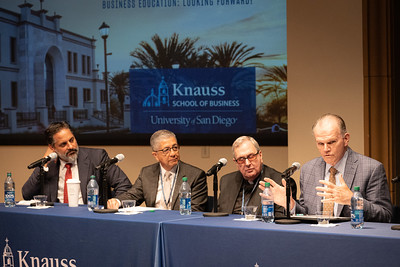San Diego, CA - The University of San Diego's Knauss School of Business proudly hosted the 26th Annual Colleagues in Jesuit Business Education Meeting in July, drawing esteemed colleagues from Jesuit and Catholic institutions near and far. This gathering of academic minds was a testament to the enduring vitality of the Jesuit and Catholic intellectual traditions.
Hosted in the newly inaugurated Knauss Center for Business Education, the event welcomed faculty from 17 universities. The conference, although hosted by the University of San Diego, was a collaborative effort showcasing the spirit of unity that is central to Jesuit education.
Diverse Dialogues: Exploring the Intersection of Faith and Business
With a packed agenda of 27 papers, the conference explored a wide array of topics, each delving into the rich intersection of faith, ethics, and business education. The papers covered subjects ranging from the opportunities and threats posed by artificial intelligence to the ethics of data-driven decision-making. Notable presentations included discussions on inspiring morally courageous leaders, a critique of SWOT analysis, and the value of immersive learning experiences.
Tina Facca-Miess, a Professor from John Carroll University, emphasized how the serene surroundings of the conference venue added depth to discussions: "Our discussions on the Inspirational Paradigm and the future of Catholic Higher Education were deeply enriched by the beauty and tranquility of such a peaceful setting."
The Future of Catholic Higher Education: The Open Circle
In his keynote address, Fr. James Heft, SM, a scholar in residence at the University of Dayton, presented a paradigm inspired by his book, "The Future of Catholic Higher Education: The Open Circle." He outlined the historical context of Catholic higher education and introduced three potential university models: the Market Place of Ideas, the Closed Circle, and the Open Circle. Heft passionately argued why the Open Circle model is best suited for the future, emphasizing the need for universities to be distinctive and open to a variety of ideas.
Fr. Heft stated, "The best way to reach the future is to create and sustain universities as open circles — to be distinctive and open to a variety of ideas. We can critique modern culture but also learn from it."
A Panel of University Presidents on Embracing the 'Open Circle'
Following Fr. Heft's keynote, a panel discussion featured three sitting university presidents: Eduardo Peñalver of Seattle University, Salvador Aceves of Regis University, and former Gonzaga University President Father Robert Spitzer, SJ. They were joined by University of San Diego President James T. Harris. Moderated by Knauss School of Business Dean Timothy Keane, the panelists shared insights on how their institutions are implementing the 'Open Circle' concept on their campuses.
The Inspirational Paradigm: A Vision for Jesuit Business Education
During lunch, Fr. Nicky Santos, SJ, from Creighton University's Heider College of Business, presented an overview of the Inspirational Paradigm, shedding light on the motivations and strategies behind its creation.
Preparing Students for a Purpose-Driven Future
Fr. Robert Spitzer took the stage to discuss "The Future of Business Education in the Jesuit Tradition." He addressed contemporary challenges facing students, including a narcissistic culture, ethical erosion, a sense of purposelessness, and the rise of identity politics. Fr. Spitzer passionately argued how strengthening the Jesuit identity within a pluralistic environment can provide a vital solution. His approach aims to instill students with a contributive identity, a commitment to principle-based ethics, dedication to justice as articulated by Catholic social teaching, a passion for service, and the integration of spirituality in business leadership.
Stephen Conroy, USD Professor of Economics and CJBE Conference Organizer, reflected on Fr. Spitzer's talk, stating, "Fr. Spitzer’s talk focused on how many of the challenges facing young people today stem largely from the ego-comparison framework ('Am I as good as my peers, particularly those I see on social media?'). He then provided a strong argument of how the 'contributive identity' and 'purpose in life' framework — which are essential to Jesuit and Catholic Business Education — can provide an important remedy for the effects of the ego-comparative framework (e.g., depression and suicide)."
The 26th Annual Colleagues in Jesuit Business Education Meeting was an inspiring confluence of ideas and values, showcasing the enduring relevance of Jesuit and Catholic traditions in shaping the future of business education. With rich discussions, diverse perspectives, and passionate presentations, the conference exemplified the commitment of these institutions to fostering ethical leaders for a changing world. We extend our gratitude to the University of San Diego and all conference organizers for making this event a memorable success.

